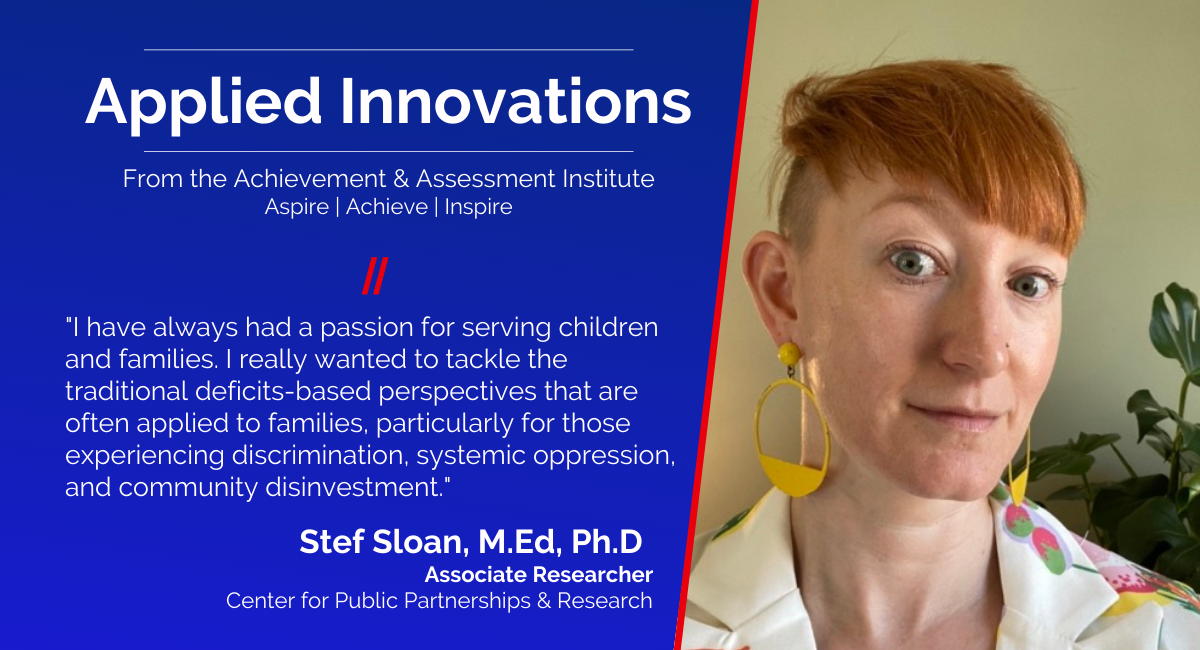Applied Innovations with Stef Sloan

The work of the Achievement & Assessment Institute (AAI) and its centers encompass a vast range of services, solutions, and partnerships. In our short interview series, Applied Innovations, we get to know some of the talented members of our team and their projects, across our many centers and various areas of impact.
In this edition, we meet Stef Sloan, M.Ed, Ph.D, an Associate Researcher with AAI's Center for Public Partnerships & Research.
Can You Tell Us a Little About Yourself?
In this edition, we meet Stef Sloan, M.Ed, Ph.D, an Associate Researcher with AAI's Center for Public Partnerships & Research.
I live in the Kansas City metro area with my partner, four children, dog, and cat. I am active in the advocacy community and serve as the 2nd District Commissioner for the Kansas City LGBTQ Commission established by Mayor Lucas. I like attending my children’s extra curriculars and also participate in my own! I play on the Stonewall Sports Kickball League and can also be found at the park on roller skates.
What Attracted You To Your Field?
I have always had a passion for serving children and families. I really wanted to tackle the traditional deficits-based perspectives that are often applied to families, particularly for those experiencing discrimination, systemic oppression, and community disinvestment. I had a desire to focus my career on highlighting protective factors, resilience, and strengths-based approaches to conducting child and family research.
I completed my doctoral work in Human Development and Family Science with a focus on Participatory Action Research methods (PAR). PAR methods aim to highlight systemic inequities as central to the lived experience of children and families, and work to dismantle power dynamics that perpetuate disparities. I was motivated to apply PAR approaches to community needs assessment and program evaluation, which landed me at the Center for Public Partnerships & Research.
What Populations Do You or Your Center Support?
The Center for Public Partnerships & Research focuses broadly on serving children and families through partnerships with community and state agencies, non-profit organizations, and families themselves. While much of our work is centered in Kansas, we also do work in a number of states across the country.
Some specific populations I work with include individuals with lived experience navigating the child welfare system, community-based child maltreatment prevention providers, and child welfare organizations. My work also focuses on partnering with those who have been historically excluded from, or underrepresented in child and family research, positions of power, or decision-making.
What Are Your or Your Center’s Key Projects?
One of my primary projects includes leading evaluation efforts on community-based child maltreatment prevention programs in the state, which aim to differentiate poverty from neglect, leverage protective factors, and promote access to basic needs. I also help design innovative primary and secondary child maltreatment prevention strategies, particularly to bridge access to community supports that can help Kansas families avoid destabilizing crises. One of these innovative projects include designing and evaluating multi-disciplinary preventative legal services to support families with civil legal issues such as housing or eviction problems, accessing benefits, or navigating debt-collection.
We have also forged a partnership with the Harvard Access to Justice Lab to conduct a randomized control trial to examine the impacts of preventative legal services on child maltreatment and family separation rates.
I also work on a variety of other projects center-wide to support Participatory Action Research methods. For example, through our SenseMaker® project, we utilize a story collection approach to capturing and making sense of the real-time needs of children and families. I am also working with the Kansas Department of Health and Environment to evaluate their Chronic Disease Risk Reduction programs using a visual-participatory method called Ripple Effects Mapping.
What Are Some Future Opportunities or Upcoming Initiatives That Excite You?
At CPPR, we really prioritize the use of innovative, community-driven research and evaluation work. We are finding that partners are becoming more interested in using evaluation approaches that address systemic inequities and disparities. It is really exciting to see the momentum building around using Participatory Action Research approaches to needs assessment, evaluation, and academic research. I am looking forward to helping our various partners use this approach, and being a part of CPPR as we establish ourselves as leaders in the field of participatory approaches.
What About Working at a Mission-Driven Organization Like AAI Appeals to You?
Working at AAI has provided me the opportunity to illuminate systemic inequities that impact children and families, while also designing and implementing solutions. As a researcher, I am not only able to utilize innovative, community-centered research and evaluation methods, but I am able to directly contribute to the lives of children and families as well as the larger scientific community. It’s the best of both worlds!
